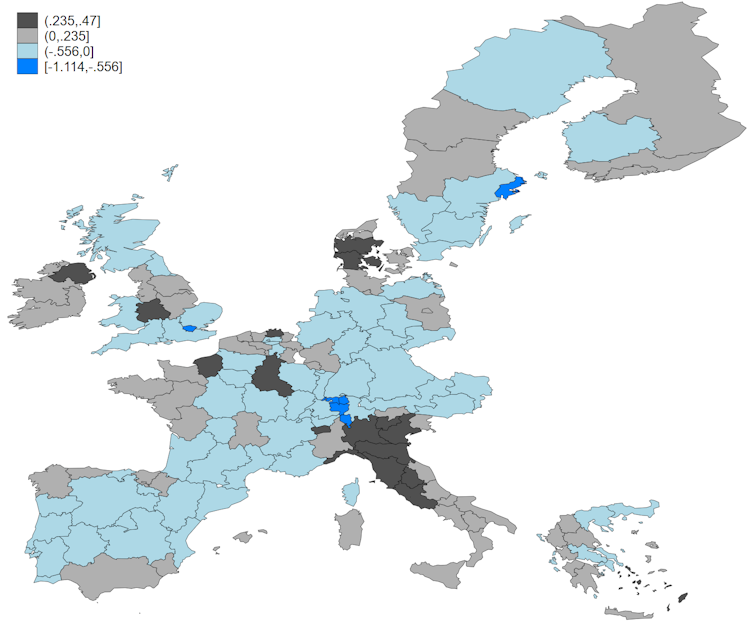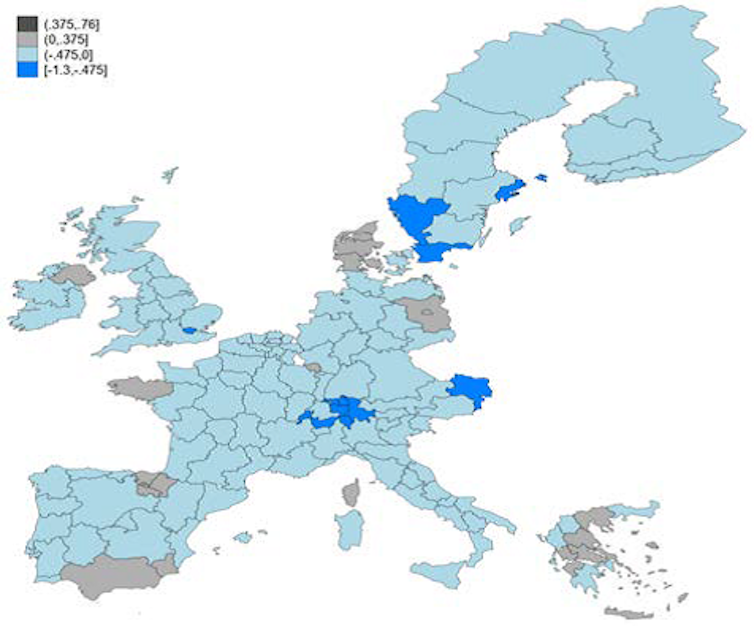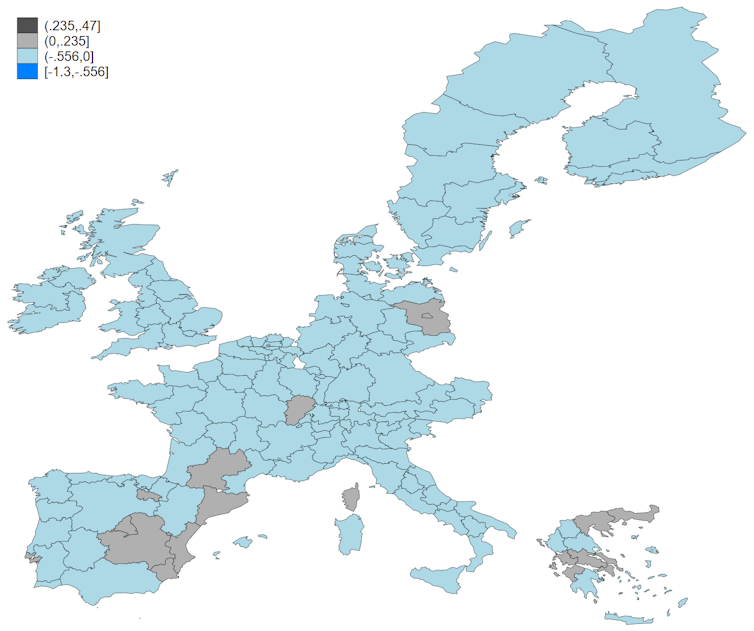The impact of immigration on EU countries’ nationalistic sentiments

Share
From the United Kingdom to Italy, Austria, and other European countries, recent elections have shown that nationalist and populist parties are attracting an increasing number of voters. While specifics of each party can be quite different, many are critical of the process of European integration led up to now. In particular, they often see the construction of the EU as impinging on national sovereignty, and many share strong views against immigration.
Given the current political context, to what extent are the immigration flows of the last decade associated with the rise of these nationalist parties? We propose a summary of what we learned from recent research, including ours, in the context of a broader project that studies the role of migration on labour supply in Europe.
Impact of immigration on natives’ attitudes and voting behaviour
One possibility is that immigration itself may have led to a rise in anti-immigrant sentiments. Native-born residents of Europe can perceive immigrants as direct competitors in the labour market as well as a drag on the welfare system (for example, pensions) and on public resources such as schools and hospitals. Rightly or wrongly, some natives believe that immigrants will not adapt to local culture and social norms and may increase crime rates, thus reducing the cohesion and the sense of safety in their society.
In the wake of large immigrant inflows, such attitudes may lead natives to support policies promised by nationalist parties. Nationalist parties have been on the rise in Germany with the electoral success of Alternative for Germany, in Italy with the Northern League, in Austria with the Freedom Party of Austria, in Switzerland with the Swiss People Party and in France with the Rassemblement National (formerly the Front National).
One may think that countries experiencing the rise of nationalist movements are those where migration has become more intense. However, a deeper scrutiny of the data reveals a more complex story.
Low-educated migrants can give rise to a backlash
Evidence from US elections between 1990 and 2010 suggests that the effect of migration on voting of US citizens actually depends on the education level of immigrants. The backlash effect is concentrated in electoral districts where the inflow of low-skilled immigrants (i.e., with primary or secondary education at most) was largest.
In Europe, similar evidence emerges from the analysis of the 2016 French presidential elections, which showed districts with large inflows of low-educated immigrants also experienced an increase in electoral support for the Front National.
We recently studied how migration to European regions affected the vote in 28 elections between 2007 and 2016 in 12 European countries. We find that a standard deviation increase in the share of low-skilled migrants in a region (roughly 6 percentage points) increased nationalist intensity, expressed by voting, by an amount equal to the distance between a “radical left” party and a “confessional conservative” party. This effect is robust to confounding factors that may affect both the stock of migrants in a region, and the voting behaviour of native residents.
Moreover, we also show that the voting response to immigration varied with the characteristics of voters. Education stands out as the most important factor: less-educated citizens became much more nationalist in response to low-skilled migration relative to more educated ones. The same is true for older voters (say, 58 years or older) compared to younger ones (between 18 and 57), and for males compared to females. Finally, the nationalist response to immigration was stronger in small towns than in urban areas.
Highly educated migrants dampen nationalism…
Is this the end of the story? No, a second effect is also at work. Our study reveals that inflow of high-skilled migrants (i.e., with tertiary or higher education) shifts votes away from nationalist parties to progressive ones such as the socialist and liberal parties in Europe.
Overall, the magnitude of this opposite effect depends on the individual characteristics of voters. Citizens who are less educated, male and younger voted much less for nationalist parties once exposed to high-skilled migration relative to those who are more educated, female and older.
Why did high-skilled immigration reduce nationalist voting? Besides the local economic benefits, we show that high-skilled migration raises political awareness of natives by increasing trust for European and national institutions. High-skilled immigrants may also exert a peer effect, as they themselves are pro-Europe and encourage pro-European vote by increasing the turnout among younger cohorts, known to be more open to a global view.
In our study, we simulate alternative scenarios regarding the effects of low- and high-skilled immigration on nationalist voting in Western European regions (NUTS2 level). In Panel A, we simulate the effects of the observed migration flows between 2007 and 2016.

A prevalence of low-skilled immigration increased nationalist voting in Italy, and in several regions in the UK, Denmark, and France (light and dark grey areas). Conversely, a predominance of high-skilled migration predicted a reduction of nationalist voting in regions such as Madrid (Spain), Provence-Alpes-Côte d’Azur (France), Zurich (Switzerland) and Greater London (UK) (areas in light and dark blue).
Restrictions proposed by nationalists may not be credible.
As confirmed by the 2019 European elections, nationalist parties have significant support in a number of EU countries. With decisional power at the national or even EU level, would Matteo Salvini, Marine Le Pen and Nigel Farage actually use it to restrict low-skilled immigration, as they claim?
We provide a note of caution with the help of Panel B, which depicts a hypothetical scenario of no low-skilled migration in Europe.

Perhaps unsurprisingly, it shows that in such a scenario, nationalist parties lose political consensus. Basing their political agenda on migration, nationalists have in large part become single-issue parties. Were they be able to close borders to low-educated migrants, the electorate may move away from them and vote on the basis of concerns other than migration. Hence stopping low-skilled migration may not actually be in their long-run political interest.
Alternatively, incumbent nationalist governments may consider measures that restrict migrants’ access to welfare. Support for these policies is also rooted into negative views of European residents who fear the reliance of low-skilled immigrants on the welfare state. Such measures have the ultimate effect of worsening migrants’ living conditions, without necessarily reducing their inflow.
… while balanced migration can reduce nationalism
So, is the spread of nationalist movements inevitably associated with large immigration? Given the nuanced effects of the skill mix of migrants, the answer is no. Panel C presents a scenario with balanced regional inflows of low-skilled and high-skilled immigrants.

Educated immigrants in Italy, UK and Denmark could create local economic benefits, enhance trust and steer natives away from nationalistic views, offsetting the impact of low-skilled migration. The political problem that immigration is creating, by steering natives toward nationalist parties, could actually be solved by immigration itself with the right skill composition.
“Skill of the Immigrants and Vote of the Natives: Immigration and Nationalism in European Elections 2007-2016”, Simone Moriconi, Giovanni Peri, Riccardo Turati, NBER Working Paper No. 25077, September 2018.
Simone Moriconi, Associate professor, IÉSEG School of Management; Giovanni Peri, Professor of Economics, University of California, Davis et Riccardo Turati, PhD candidate in Economics, Université catholique de Louvain (UCLouvain)
This article is republished from The Conversation under a Creative Commons license. Read the original article.
.


